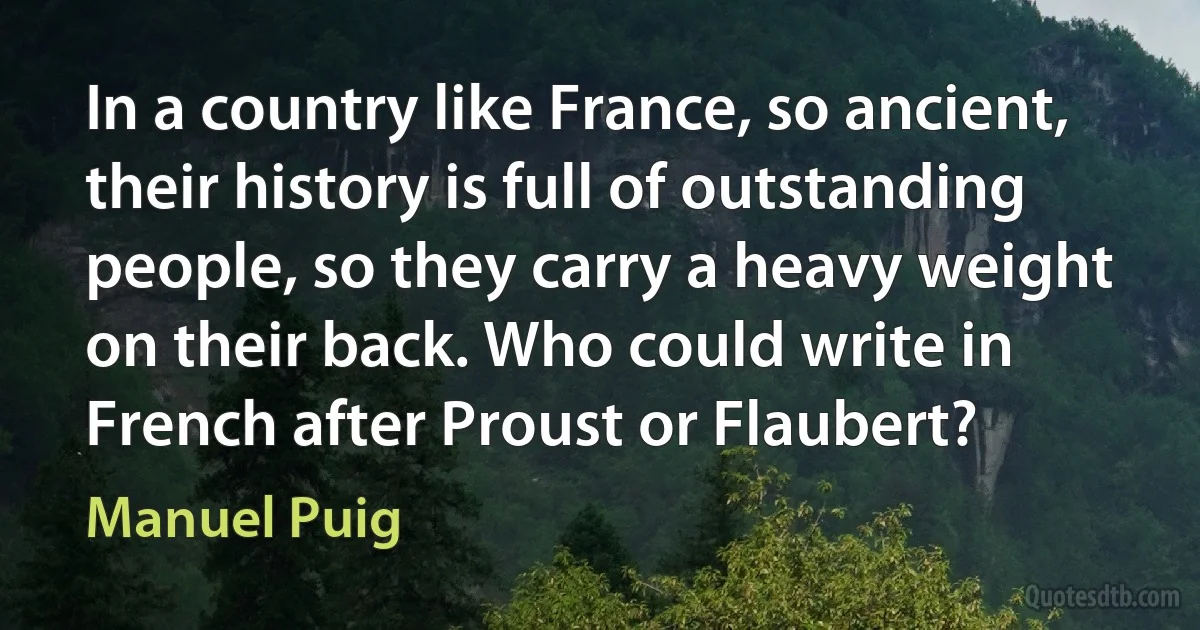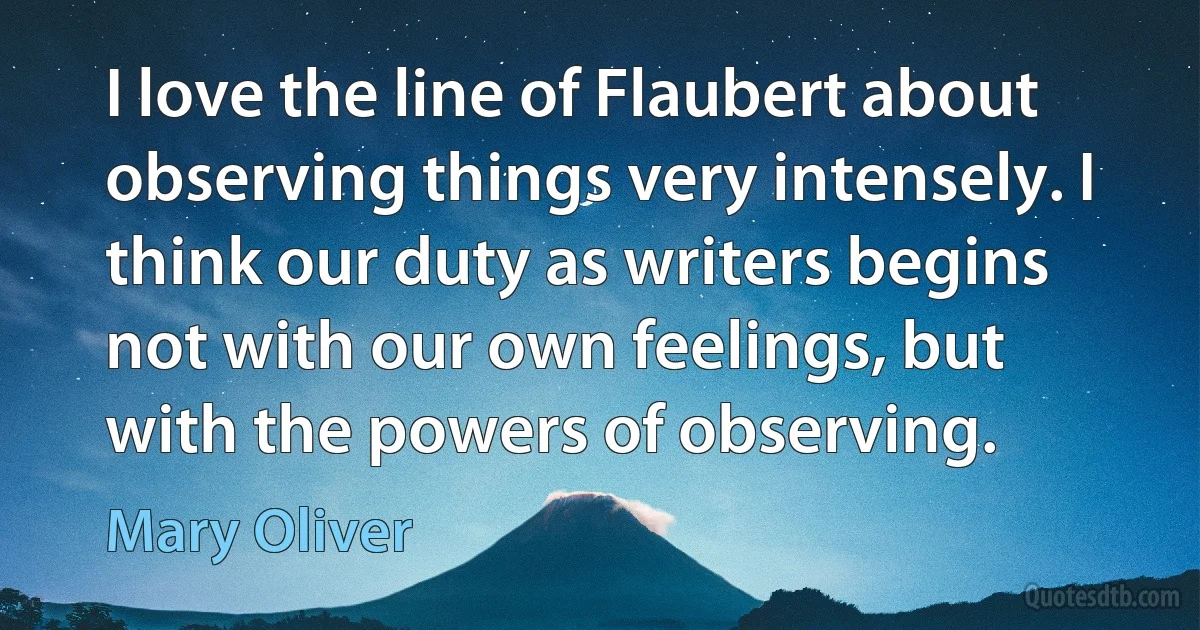Flaubert Quotes
We do not, of course, write literary criticism at all now. Academe has won the battle in which Wilson fought so fiercely on the other side. Ambitious English teachers now invent systems that have nothing to do with literature or life but everything to do with those games that must be played in order for them to rise in the academic bureaucracy. Their works are empty indeed. But then, their works are not meant to be full. They are to be taught, not read. The long dialogue has broken down. Fortunately, as Flaubert pointed out, the worst thing about the present is the future. One day there will be no... But I have been asked not to give the game away. Meanwhile, I shall drop a single hint: Only construct!

Gore Vidal
All this will have left you disposed to understand one of our principal Futurist efforts, which consists of abolishing in literature the apparently indissoluble fusion of the two concepts of Woman and Beauty. This ideological a fusion has reduced all romance to a sort of heroic assault that a bellicose and lyrical male launches against a tower that bristles with enemies, a story which ends when the hero, now beneath starlight, carries the divine Beauty-Woman away to new heights. Novels such as Toilers of the Sea by Victor Hugo or Salammbô by Flaubert can clarify my point. It is a matter of a dominant leitmotif, already worn out, c of which we would like to disencumber literature and art in general.

Filippo Tommaso Marinetti
Dr Williams's book is about a number of nineteenth-century French writers who caught syphilis and probably died of paresis. They are Baudelaire, Jules de Goncourt, Flaubert, Guy de Maupassant and Daudet. A similar book could probably be written about nineteenth-century British writers, including such unlikely victims of syphilis as John Keats and Edward Lear. People were not so frightened of the disease as we are. Few physicians saw the connection between cerebral degeneration and the primary chancre: when the secondary stage of the infection had healed, it was generally assumed that everything was over and lightning would not strike the tree again. This was Baudelaire's belief. One could even rejoice at picking up the pox: it was not merely an inoculation; it advertised one's virility to the world....

Anthony Burgess
We write in the language of Dryden and Addison, of Milton and Shakespeare, but the intellectual world we inhabit is that of Flaubert and Baudelaire; it is to them, and not to their English contemporaries, that we owe our conception of modern life. The artist whose reward is perfection and where perfection can be obtained only by a separation of standards from those of the non-artist is led to adopt one of four rôles: the High Priest (Mallarmé, Joyce, Yeats), the Dandy (Firbank, Beerbohm, Moore), the Incorruptible Observer (Maugham, Maupassant) or the Detached Philosopher (Strachey, Anatole France). What he will not be is a Fighter or Helper.

Cyril Connolly
It came upon me sometime in my fifteenth year that I no longer woke up with sudden excitements-"Today I will get the Clerici solution! Today I will read about Humphry Davy and electric fish! Today I will finally understand diamagnetism, perhaps!” I no longer seemed to get these sudden illuminations, these epiphanies, these excitements which Flaubert (whom I was now reading) called "erections of the mind.” Erections of the body, yes, this was a new, exotic part of life-but those sudden raptures of the mind, those sudden landscapes of glory and illumination, seemed to have deserted or abandoned me. Or had I, in fact, abandoned them?

Oliver Sacks
Flaubert read too many books, and in consequence some of his own books stagger under the weight of his erudition. He said he'd read some preposterous number of books to prepare for the writing of Salammbô, and you can feel them dragging the novel down. It would have been much better if he'd made it all up.

John Banville
Writing stories was not easy. When they were turned into words, projects withered on the paper and ideas and images failed. How to reanimate them? Fortunately, the masters were there, teachers to learn from and examples to follow. Flaubert taught me that talent is unyielding discipline and long patience. Faulkner, that form – writing and structure – elevates or impoverishes subjects. Martorell, Cervantes, Dickens, Balzac, Tolstoy, Conrad, Thomas Mann, that scope and ambition are as important in a novel as stylistic dexterity and narrative strategy. Sartre, that words are acts, that a novel, a play, or an essay, engaged with the present moment and better options, can change the course of history. Camus and Orwell, that a literature stripped of morality is inhuman, and Malraux that heroism and the epic are as possible in the present as is the time of the Argonauts, the Odyssey, and the Iliad.

Mario Vargas Llosa
Like me, for instance, who can count so many years in my life when I completely lost all inclination to laugh, leaving aside whether or not this was my own fault, I for one need above all just to have a good laugh. I found that in Guy de Maupassant and there are others here, Rabelais among the old writers, Henri Rochefort among today's, where one can find that - Voltaire in 'Candide'. On the contrary, if one wants truth, life as it is, De Goncourt, for example, in 'Germinie Lacerteux', 'La fille Elisa', Zola in 'La joie de vivre' and 'L'assommoir' and so many other masterpieces paint life as we feel it ourselves and thus satisfy that need which we have, that people tell us the truth. The work of the French naturalists Zola, Flaubert, Guy de Maupassant, De Goncourt, Richepin, Daudet, Huysmans is magnificent and one can scarcely be said to belong to one's time if one isn't familiar with them.

Vincent van Gogh
Flaubert and Nietzsche have emphasized the importance of standing up and walking in the process of thinking. The peripatetics were perhaps motivated by the same awareness. Yet purposeful walking - what we call marching - is an enemy of thought and is used as a powerful instrument for the suppression of independent thought and the inculcation of unquestioned obedience.

Eric Hoffer
I started reading Flaubert's 'Salambô'. The first chapter was very strong. I prefer Flaubert above Zola, the Concourt even more. No doubt you know the Concourts, Edm. and Jules, two brothers. 'Manette Salomon' is one of their most beautiful creations. If you could read that, I believe you do me and yourself a great pleasure. The type of Chassagnol, the man who understands so much about Art - yes, he has the purest ideas on art of all - I find [him] adorable. He understands everything and that's why he can not be an artist himself or the greatest. I recommend that book to anyone, layman or painter and I will buy it myself.

George Hendrik Breitner
Flaubert poses as the outsider with insider information who excoriates a reality as degraded and mendacious. It is as if the literary standing of the author in the world of imagination and fiction paradoxically grants him a greater access to the truth than would be available in the falseness of empirical existence.

Russell Berman
Flaubert spoke true: to succeed a great artist must have both character and fanaticism and few in this country are willing to pay the price. Our writers have either no personality and therefore no style or a false personality and therefore a bad style; they mistake prejudice for energy and accept the sensation of material well-being as a system of thought.

Cyril Connolly
I do not see this novel as solely dealing with LGBT issues. I see Sirena as a metaphoric representation of the whole Caribbean. The fact that s/he is a transvestite is just a fact. Basically, I did what Flaubert did with Emma Bovary. He talked about his society through the character of a woman-an adulterous woman...

Mayra Santos-Febres
The more I have thought about Figures of Earth - and its sequel The Silver Stallion - the more remarkable they have come to seem. Looking back, one can now understand the abrupt fluctuations of Cabell's fame. ... Published when Cabell was forty-two, the chronicle of Manuel the Redeemer was not a book for the Young nor was it a book in the mood of the twenties. The story of the ambitious man of action who is cowardly, malignant and treacherous and who does not even enjoy very much what his crimes and double-dealing have won him, but who is rapidly, after his death, transformed into a great leader, a public benefactor and a saint, has the fatal disadvantage for a novel that the reader finds no inducement to identify himself with its central figure. Yet I am now not sure that this merciless chronicle in which all the values are negative except the naked human will, is not one of the best things of its kind in literature - on a plane, perhaps, with Flaubert and Swift.

Edmund Wilson


